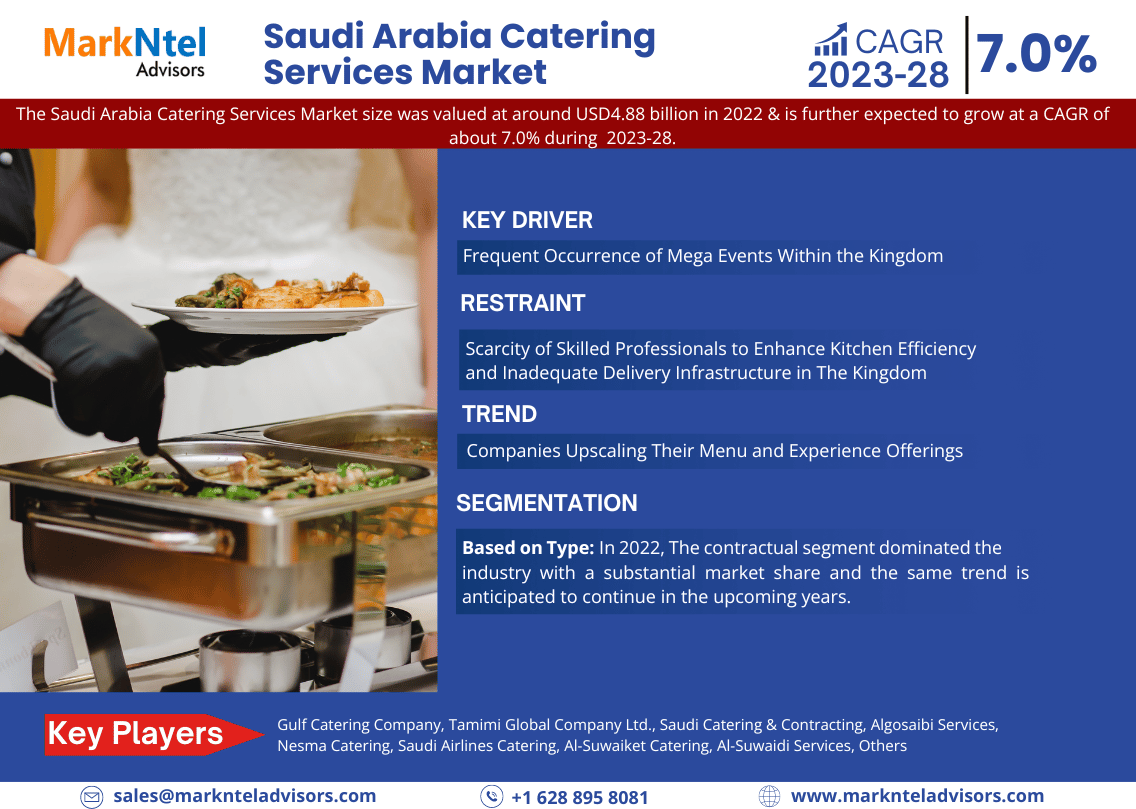The flourishing energy sector, with Saudi Arabia being a global giant in oil and gas, has significantly amplified the need for caterers catering to oil rigs, ensuring timely and ample provisions for the offshore platforms.
In 2022, the Saudi Arabia Catering Services Industry reached a notable valuation of approximately USD 4.88 billion, marking a promising trajectory for the years to come. The forecasts by MarkNtel Advisors indicate a compound annual growth rate of about 7.0% from 2023 to 2028. This robust growth is attributed to numerous factors, most prominently the growing demand for catering services in various domains, including events, social gatherings, healthcare facilities, corporate offices, and educational institutions, among others.
Moving further, let us explore the potential trends and strategies likely to shape and elevate the catering industry within the Saudi Arabian market.
Cultural Fusion Cuisine
As our world grows more interconnected, the culinary landscape has dramatically evolved, with a vast array of ingredients and culinary traditions from various corners of the globe becoming readily available. This surge in diversity has empowered Arab consumers to delve into an extensive selection of international cuisines, enabling them to embrace novel flavors and enriching gastronomic adventures. Additionally, globalization has significantly impacted restaurant aesthetics and communication, with numerous eateries embracing multilingual menus and diverse design elements to cater to their increasingly varied customer base.
Sustainable and Ethical Practices
In line with its commitment to sustainability and the vision outlined in Vision 2030, Saudi Arabia is making great strides in transforming itself into a global hub for sustainable tourism. The hospitality sector is vital in embedding sustainability into travel and tourism-related developments.
Recognizing the importance of environmental responsibility, businesses are increasingly adopting practices that contribute to a more sustainable future. For instance, a key focus is sourcing local and organic ingredients for their culinary offerings. In addition to sourcing locally and organically, the industry is diligently working to minimize food waste. Restaurants and hotels are implementing innovative strategies to reduce excess food, such as carefully planning portions, donating surplus food to local charities, or utilizing food waste for composting or conversion into energy.
The catering industry is emphasizing opting for biodegradable, recyclable, or reusable packaging materials, reducing the impact of plastic waste on the environment. By making such sustainable choices, the industry aligns with the growing environmental consciousness among consumers in Saudi Arabia.
Health-Conscious Menus
Offer health-focused catering options with a variety of nutritious and balanced meals. Incorporate fresh ingredients, lean proteins, and low-sodium options to cater to the growing health-conscious consumer base.
For many years, people in Saudi Arabia have often chosen to use their leisure time in restaurants and shopping centers. Food has been a primary form of entertainment in the kingdom, especially due to the challenging climate restricting outdoor activities for a significant part of the year. In 2019, the Ministry of Health initiated a policy mandating restaurants to display calorie information on their menus. This measure aims to promote healthier eating habits among the populace.
Technology Integration
Implement advanced technology for online ordering systems, digital menus, and payment solutions to enhance customer convenience and streamline operations. Also, explore AI-powered tools for personalized menu recommendations. Likewise, adapt to the rise of virtual events by offering tailored catering packages for virtual meetings, webinars, and remote team gatherings. Consider hybrid options that cater to both in-person and virtual attendees.
For example, Saudi Airlines Catering Company is deeply dedicated to continually improving its operations. Acknowledging the necessity for modernization, its leadership initiated a transformative process. They leveraged Microsoft Power Apps to automate and enhance data processing procedures. This journey involved shifting from manual data collection to digitalizing processes through various business applications. Consequently, the company significantly reduced its reliance on paper and cut costs associated with business card printing by implementing a digital business card app. Additionally, the introduction of real-time dashboards has empowered all team members to base their decisions on up-to-date data, facilitating prompt value delivery to customers.
Experiential Dining
Create unique and memorable dining experiences by incorporating interactive elements, themed events, live cooking stations, or chef demonstrations during events. This adds an entertainment factor to your catering services.
La Brasserie, for instance provides an immersive dining experience where guests and the chef cultivate a unique connection, enabling diners to tailor their dishes to their preferences.
With its timeless allure infused with contemporary elements, the restaurant invites guests on a culinary expedition, savoring genuine flavors from various corners of the globe. The establishment ingeniously melds open kitchen concepts and interactive serving counters to elevate and enrich the dining adventure.
All In All, To stay ahead in the catering industry in Saudi Arabia, it’s essential to continually monitor consumer preferences, industry trends, and technological advancements. Additionally, fostering creativity, embracing innovation, and providing exceptional customer service will help set your catering business apart and ensure long-term success.
Contact Us –
Call: 📞 +1 628 895 8081, +91 120 4278433
Email: 📧 sales@marknteladvisors.com
Visit to know more: 🌐 www.marknteladvisors.com




